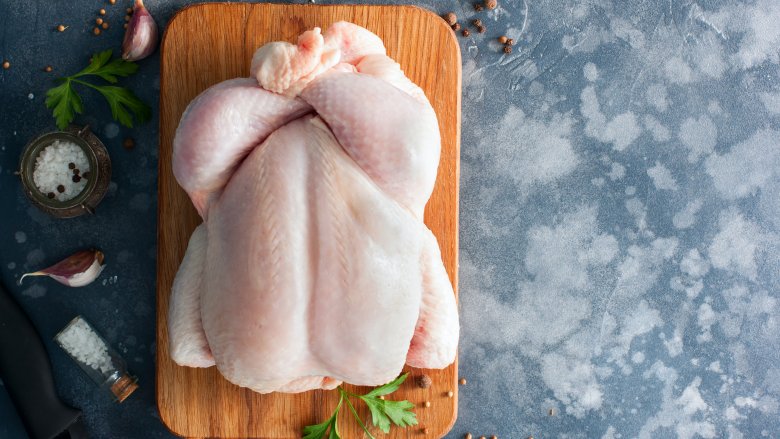Should You Wash Chicken Before Cooking It?
It's the age-old debate when it comes to raw chicken: To wash, or not to wash?
Why would someone want to wash raw chicken? There are a few reasons...
For starters, there's all that slimy pink juice clinging to the meat. What is that juice anyway? Is it blood? Nope. According to the USDA's food safety site Ask Karen, it's just water that's been absorbed during the chilling process, so there's really no need to rinse off water with more water. (And if it's crispy skin you're worried about, rinsing isn't necessary there either — just get out the paper towels and blot, blot, blot until that bird is dry.)
Okay, but what about the bacteria? Raw chicken is known to be contaminated with campylobacter, salmonella, and clostridium perfringens bacteria, and all those nasty pathogens can cause food poisoning. Nobody wants to risk foodborne illness, and a quick rinse under the faucet means that any bacteria is sent packing down the drain, right? Not necessarily. What you might not realize is that your sink, countertops, and other nearby food, cookware, or utensils can become contaminated in that rinsing process. How? Think about what happens when you wash your hands: Even when you're being careful, the force of the watering hitting your skin produces splatter. When it's soapy water, it's not such a big deal. But when it's salmonella-tainted chicken water, that splatter becomes a bit more concerning. In fact, the CDC recommends against washing raw chicken for this very reason. What's more, according to the USDA, rinsing chicken doesn't even eliminate all the bacteria, since some clings so tightly to the surface of the meat that no amount of rinsing will remove it. In effect, you end up transferring some bacteria to your kitchen surfaces, and others go completely unaffected. Not exactly a win-win. The only true way to get rid of bacteria is to cook your chicken to an internal temperature of 165 degrees Fahrenheit.
Is there ever a case for washing chicken? According to food writer and noted home cook Michael Ruhlman, there is. Oftentimes poultry comes complete with bone fragments and other viscera that's either stuck to the skin, or stuck inside the cavity. None of those are necessarily things we want to impact the flavor of our finished chicken dish, and a quick rinse will easily eliminate any unwanted detritus. But what about all that bacteria you're spreading around? Ruhlman thinks we're all overreacting just a bit. And so does his pal, celeb chef and trusted fount of food knowlege, Alton Brown. As Brown so eloquently put it, "We all need to calm the f*** down." To illustrate his point, he even took to Twitter to detail exactly how we can all be sure that our homes are free of germs after rinsing a chicken, including the step-by-step advice of dousing the home in accelerant, setting it aflame, and then nuking said site. A bit of hyperbole? Yes — but as Ruhlman points out, "If you're too busy to wash your own lettuce and buy the 'pre-washed' packaged stuff, that's probably more of a risk than rinsing a chicken in your sink."
So what's the final word on this polarizing topic? NPR asked food safety researcher Jennifer Quinlan of Drexel University for the straight dope on the subject, and even tried to get her to agree that running the faucet at a slow speed might eliminate the risk. She advised that there isn't a "safe water speed" for rinsing poultry, as any disruption can cause the spread of bacteria, and said, "I can't make you not take the risk, but you need to know what you are dealing with." Quinlan continued, explaining that if you're washing your chicken for safety reasons, you should just stop, plain and simple. If it's to enhance flavor, like removing those bits of viscera as Brown and Ruhlman do, she advises that you at least take proper precautions in the process.
Quinlan also told NPR that some people have said that they rinse their chicken due to the smell or taste of chlorine in the meat. To that, she said bluntly, "you need to change where you're getting your chicken." And if you think that none of this applies to you because you spend five times as much buying organic chicken, think again. Studies have shown that conventionally raised birds have about the same amount of bacteria as those natural, air-chilled, fancy-schmancy organically raised chickens, so if you rinse, rinse with the same amount of caution as you would an unorganic bird.
